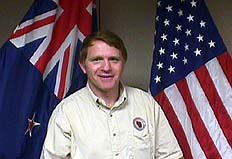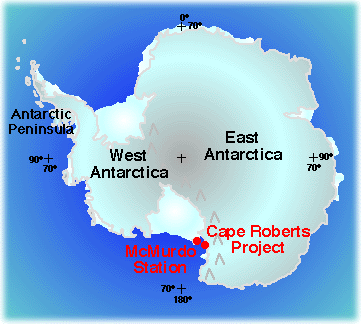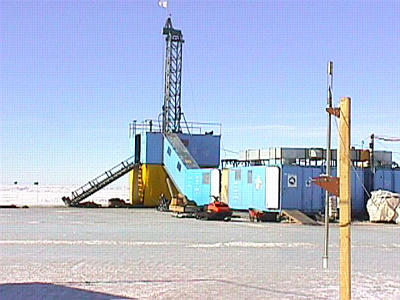





My name is Bruce Smith. I am from Appleton, Wisconsin. Appleton is in the
northeastern part of Wisconsin just at the base of the "thumb" as you look
at a map of the state. I am a Green Bay Packer fan. I have taught science
for 25 years. I have taught mostly chemistry but also earth science, life
science, physics, environmental science and math. I went to college at the
University of Wisconsin - Stevens Point and got my masters degree at the
University of Wisconsin - Oshkosh. I also teach meteorology and am a member
of the American Meteorological Society. I serve as an Atmospheric Education
Resource Agent (AERA) for our region. I try to help other teachers learn
new ways to teach weather to their students. I love to fish and I hope to
do some ice fishing in the Antarctic when I get there. I have traveled to
many parts of the United States as well as Canada, England, Scotland and
the Bahamas. I am married and have two children, Ellie and Matthew. Ellie
is a sophomore in high school and Matt has graduated from high school. Both
are quite talented, Ellie in several sports and Matt in music and writing.
I am proud of them both. My wife, Pam, is also a teacher. She teaches high
school English.
I think teaching is one of the most rewarding and exciting professions a
person can undertake and I am proud to be a teacher. One of the reasons
that teaching is such a great profession is that it gives me opportunities
such as the Teacher Experiencing Antarctica (TEA) program. I really do not
think I would have ever had this opportunity had I not chosen teaching as a
profession. Through teaching I have had the opportunity to be part of the
lives of many wonderful young people and watch them learn and grow. Many of
my students have gone on to be teachers and scientists. I am proud of this
as well.
I look forward to sharing my experiences "on the ice" with all of
you during the 1999 Summer Antarctic season.

Bruce will work at McMurdo Station and at the drill site for the Cape
Roberts Project.

The 1998 Cape Roberts drill site. Photograph courtesy of Betty Trummel,
Husmann Elementary (TEA 1998/1999).

Investigating Past Climates through Palynology of the Cape Roberts
Drill Cores
Dr. John H. Wrenn, Louisiana State University
The project I will be working on while in the Antarctic is one dealing with
microfossils from sea-bottom drill cores. I will be working with a group
from Louisiana State University at Baton Rouge (LSU) headed by the
Principle Investigator (PI) Dr. John Wrenn. Dr. Wrenn is the head of the
Center for Excellence in Palynology at LSU. Palynology is a discipline of
science that studies microfossils such as pollen grains and other
organic-walled microfossils. By studying these fossils, scientists can
learn a great deal about the environment and climate at the time the
deposits containing the fossils were laid down. Learning about past
climates can help us understand how our climate is changing now and how it
might change in the future. Evidence from these microfossils can also help
us understand how the oceans have changed and how the continents have moved
over geologic time.
In the Antarctic, I will be working out of the scientific station
at McMurdo Station. I will be helping analyze drill cores taken at a drill
platform on the Ross Ice Shelf at place called Cape Roberts. This summer, I
will be going to southern Louisiana to work with Dr. Wrenn and his team to
learn what I need to know to be part of this exciting scientific endeavor.

